
- Subject:
- Psychology
- Social and Behavioral Sciences
- Provider:
- Rice University
- Provider Set:
- OpenStax College



By the end of this section, you will be able to:Distinguish between sensation and perceptionDescribe the concepts of absolute threshold and difference thresholdDiscuss the roles attention, motivation, and sensory adaptation play in perception
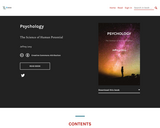
The first chapter provides an overview of the textbook and reviews the history of psychology and its methodology. Psychology is described as a science studying how hereditary (nature) and experiential (nurture) variables interact to influence the thoughts, feelings, and behavior of individuals. The remainder of the text will be organized in sections entitled “Mostly Nature” (Biological Psychology; Sensation & Perception; Motivation & Emotion), “Mostly Nurture” (Direct Learning; Indirect Learning (i.e., observational learning and language); Cognition), and “Nature/Nurture” (Human Development; Personality; Social Psychology; Maladaptive Behavior; Professional Psychology and Human Potential).
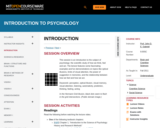
This session is an introduction to the subject of psychology: the scientific study of how we think, feel and act. The lecture features some fascinating examples and fun demonstrations on topics like optical illusions, limits of visual attention, the power of suggestion in memories, and the relationship between how we feel and how we act.
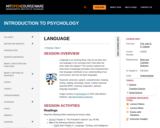
Language is an amazing thing. How do we learn and use language in our everyday lives? How does the brain make this happen? This session explores the brain basis of language perception and comprehension, how language contributes to our understanding of our environment, and how we learn languages.
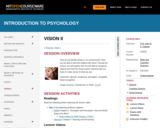
How do we identify things in our environment? How are we able to perceive objects like faces? During this lecture, we will explore how we are able to recognize objects and how the visual system interacts with our brain to make sense of what we see.
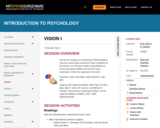
How do we visualize our environment? What problems must the visual system overcome? Upon completion of the session, you will have a better understanding of human perceptual abilities and how the neural substrates of vision are organized in the brain.
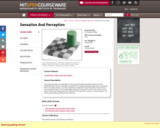
"This course provides an introduction to important philosophical questions about the mind, specifically those that are intimately connected with contemporary psychology and neuroscience. Are our concepts innate, or are they acquired by experience? (And what does it even mean to call a concept 'innate'?) Are 'mental images' pictures in the head? Is color in the mind or in the world? Is the mind nothing more than the brain? Can there be a science of consciousness? The course will include guest lectures by Professors."
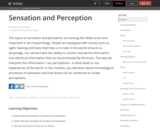
The topics of sensation and perception are among the oldest and most important in all of psychology. People are equipped with senses such as sight, hearing and taste that help us to take in the world around us. Amazingly, our senses have the ability to convert real-world information into electrical information that can be processed by the brain. The way we interpret this information-- our perceptions-- is what leads to our experiences of the world. In this module, you will learn about the biological processes of sensation and how these can be combined to create perceptions.
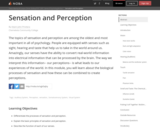
Text and links to all ancillary materials for Module 11

Purpose
In this chapter, you have learned about sensation and perception, our connection with the outside world. The purpose of this project is to investigate 1) how sensation and perception contribute to success in multiple areas of your daily life, 2) how the lack of functioning senses would be detrimental to people’s lives, and 3) how the nervous system is involved in sensation and perception.
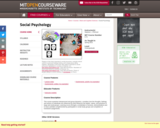
This course examines interpersonal and group dynamics, considers how the thoughts, feelings, and actions of individuals are influenced by (and influence) the beliefs, values, and practices of large and small groups. Learning occurs through a combination of lectures, demonstrations and in-class activities complemented by participation in small study groups and completion of homework assignments.
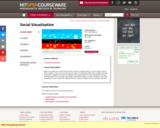
Supplementary work on individual or group basis. Registration subject to prior arrangement for subject matter and supervision by staff. From the course home page: Millions of people are on-line today and the number is rapidly growing - yet this virtual crowd is often invisible. In this course we will examine ways of visualizing people, their activities and their interactions. Students will study the cognitive and cultural basis for social visualization through readings drawn from sociology, psychology and interface design and they will explore new ways of depicting virtual crowds and mapping electronic spaces through a series of design exercises.

This course examines the issues, principles, and challenges toward building machines that cooperate with humans and with other machines. Philosophical, scientific, and theoretical insights into this subject will be covered, as well as how these ideas are manifest in both natural and artificial systems (e.g. software agents and robots).
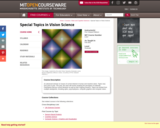
An advanced seminar on issues of current interest in human and machine vision. Topics vary from year to year. Participants discuss current literature as well as their ongoing research.

Gestalt principles do not match reality. Video provides quick descriptions of the following Gestalt principles: Figure-ground relationship, Proximity, Similarity, Law of Continuity, Closure. Duration: 1:34.

Patient P.S. suffered a stroke that damaged the right side of her brain, leaving her unaware of everything on her left side. If someone threw a ball at her left side, she might duck. But she wouldn't have awareness of the ball or know why she ducked. Where does consciousness come from? Michael Graziano explores the question that has vexed scientists and philosophers for centuries. [Directed by TED-Ed, narrated by Addison Anderson]. Duration: 4:56.

In this video, I describe the difference between sensation and perception, and provide an overview of the many (!) ways in which our body senses the environment.
Duration: 7:12.